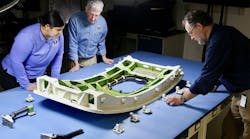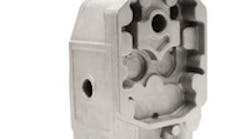A comparatively recent development in rapid prototyping is giving metalcasters more options when faced with "problem" castings. Rapid Casting Technology (RCT), available from Ex-One Prometal, was developed in Germany and has been commercially available in the U.S. for the past two years.
What is different about the technology is that it has the ability to make the molds directly from the design stage. It enables metalcasters to produce casting molds and cores directly from CAD files. By eliminating the pattern-making step, RCT can reduce production time by nearly 70%. Basically, it "slices" a 3-D model, electronically, and then "prints" the mold or core in sand. "The base materials that we use match what foundries use exactly," explains Jeffrey McDaniel, Prometal engineering and project manager. "We use silica sand and furan binding systems. All we're really doing is changing the way a mold is tooled up. We're doing it virtually."
The ability to virtually tool up the mold is what makes RCT so flexible. It allows foundries to work with castings with problem geometries or lower-volume production runs to take calculated risks without committing to tooling. "If you want to create several different variants with different cores, we can do that. We can change the entire characteristics," enthuses McDaniel.
For example, RCT can look at changes in the path of the molten metal before it touches the casting. Other issues such as gating designs and venting systems can also be evaluated. According to McDaniel, "Some people are looking at this as an alternative to investment casting where the concern is that the metal get to all the thin walls."
Although Prometal provides contract services — supplying molds, cores, assistance in building the CAD — the company also sells the machines-the S15 and SR2 system, as well. "The cost is not as prohibitive as you might think," states McDaniel. That is particularly true when you consider the reduction in production time. Since both machines also uses standard foundry sands and binders it allows for the on-demand casting of aluminum alloys, copper alloys, gray iron, ductile iron, and magnesium. A foundry can print a CAD model one day and cast the next. Furthermore, since a pattern is no longer needed, last minute design changes are no problem.
"At the moment, we have more customers coming to us for our contract services," explains McDaniel. Customers can provide the CAD designs, but the company also has the ability to scan a part and develop a mold from that point. We can also develop a mold from something two-dimensional by converting it to three-dimensional and then scanning that."
However, the company's ultimate goal is to strike a balance between the number of machines it sells and its contract services as foundries become more comfortable with the technology.
"It is just a different way to look at tooling. We're doing it virtually and that makes it quicker and more flexible for foundries." sums up McDaniel.
Read the full presentation, "Patternless Castings."










